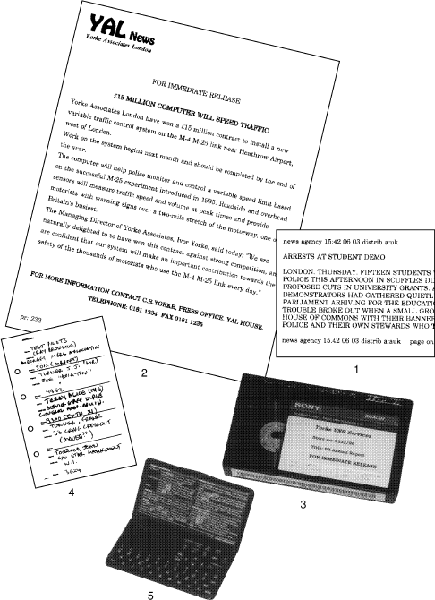Sources
Television news-related organisations are overwhelmed with unsolicited informationwhich pours in from members of the public and with every mail delivery. In some cases it provides the backbone for programme coverage, but for the rest, existence without resort to some consistent professional back-up is likely to be regarded as scarcely possible.
The agencies
Much of the raw material on which news programmes are based comes fresh from the national and international wire services. The Press Association (PA) Reuters, the Associated Press (AP), United Press International (UPI), Agence France Press (AFP) and others like them provide a valuable subscription service of reports which appear on the video screens in newsrooms all over the world. Agency staff and freelance reporters are often the first to break stories, setting the pace for others to follow if they please.
Nearer home, each news desk has its own trusted sources to supplement the flow of intelligence from which the diaries are built up. The individual reporter — particularly the specialist - has the contacts book.
Making contact
People make news — so the name, address and telephone number of anyone who is or is ever likely to be of the slightest professional use should never be discarded. Those you come across may be previous interviewees, potential interviewees or providers of fact, record or opinion. Make a note of the officials of organisations which issue invitations or publicity handouts, local politicians and celebrities. Minor officials become major ones. Local politicians become national figures. Do not forget the expertise which is bound to exist within your own circle of friends, or the organisations to which you belong. Keep headed notepaper or visiting cards containing useful names and addresses.
Correspondence columns are also useful sources. A large proportion of letters comes from those who represent organisations of all types, and a surprising number of well-known people who hesitate to list their telephone numbers openly include their addresses when writing to newspapers. Keep a record of all those who might be of use.
Starting from scratch takes time, so at first it might be worth considering sharing names with others. Begin by swapping with a colleague of similar status. If you each concentrate on one subject area at a time you will make double the progress in half the time.
Keeping the list
Lastly, when you have built up your list, keep it safely. Experienced reporters guard their contacts books jealously. It may be worth putting yours in the bank when you go on holiday.

Sources
The wire services often provide the first indication of a breaking story (1 ). Modern distribution methods ensure the raw material is available on computer screens in the newsroom. Publicity handouts (2) remain regular sources of information sometimes worthy of being followed up for coverage. High-quality video news releases, produced to broadcast standard (3) are the visual equivalent. Good reporters build their own list of contacts and guard them jealously, whether they are kept in note-book style (4) or stored electronically in the memory of personal organisers (5).
